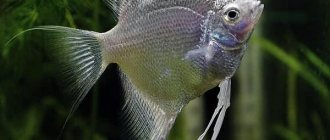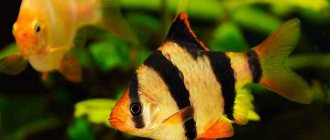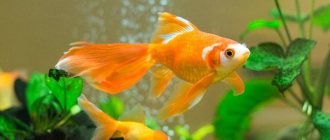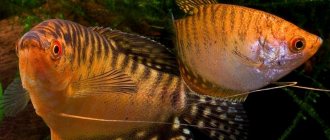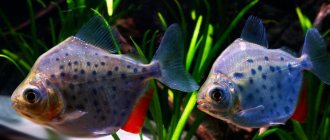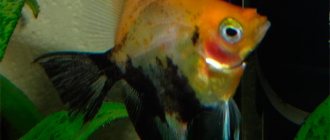Perhaps every owner of an angelfish knows that these are quite peaceful schooling fish, for which it is not so difficult to find a neighbor. But it happens that angelfish bite each other or, even worse, start a real war.
The reasons for this behavior can be different, including lack of space in the aquarium, and the spawning period, when any little things cause stress in the fish. It happens that the owners of angelfish mistake fights for mating games, but is this so?
Description of fish behavior
Angelfish are schooling fish that lead a diurnal lifestyle. Before the onset of the spawning period, they are distinguished by calm, non-aggressive behavior. During breeding, they actively protect their offspring and the territory in which they live.
Reference! Sometimes angelfish become aggressive while feeding. Therefore, owners are advised to ensure that other inhabitants of the aquarium receive adequate nutrition.
What to look for when choosing “neighbors”?
Despite the fact that this species is considered peaceful and calm, you need to remember that they belong to the cichlid family, which means they have a predatory instinct. It follows from this that not every aquarium fish is suitable for angelfish in terms of compatibility with other fish. For example, small fish should not be added to them, as they will easily eat them. On the other hand, large breeds of fish that show aggression towards others will begin to attack themselves. The main rule that needs to be remembered when angelfish are compatible with other fish: they are able to get along with many and coexist peacefully if they grow and mature together from birth. Then, even as adults, they will easily recognize their neighbors and distinguish them from newcomers.
Look at a community aquarium with angelfish.
Causes of fights and what to do?
Angelfish can fight for a variety of reasons. Attack each other and representatives of other species due to lack of space in the aquarium, protecting their fry and for various other reasons.
Angelfish are quite large fish; for the comfortable existence of one individual, a container with a capacity of at least 50 liters will be required. The water hardness should be 6.5–7.4 pH . If the aquarium volume is insufficient and the water is too hard, they become anxious and may begin to divide the territory with other inhabitants.
During the period of preparation for spawning, angelfish choose a mate, to whom they remain faithful throughout their lives. As soon as the owner notices that the “family” has formed, it is necessary to move it to a separate aquarium. Otherwise, aggressive behavior towards their relatives cannot be avoided.
Reference! In some cases, it becomes necessary to separate parents from their offspring, since some individuals tend to eat them. At the same time, it is strictly forbidden to remove eggs, as this can provoke stress in the angelfish, which in turn leads to a fight between the male and female.
In addition, the cause of fights in a couple can be the deterioration of the female’s health or her refusal to go to spawn. In this case, it is necessary to move the weaker fish into a separate container so that it can get stronger.
Preparing for spawning
At the age of 9-10 months, angelfish become sexually mature and ready to spawn. One of the features of these fish is the choice of a partner, which is usually done for life; of course, there are exceptions up to group spawning, but this is very rare.
Owners of angelfish often noticed that after the death of one of the partners, the survivor no longer looks for his other half, and sometimes even seeks to commit suicide. After you have noticed that a pair has formed, it is worth providing them with a separate aquarium; in any case, it is not worth keeping more than two “families” in a hundred-liter space, they will inevitably begin to injure each other.
If favorable conditions are created in the aquarium, then sooner or later the couple will begin to prepare for spawning. The first step is to look for a place for future eggs and thoroughly clean it, and then, after laying, drive away all uninvited guests.
During such a period, it is not surprising that the fish become very aggressive, because they protect their future offspring from neighbors who want to feast on caviar.
To avoid conflicts between residents, it is best to have a second aquarium on hand, where you can place the couple along with their clutch.
This will relieve the caviar from the role of food, and the angelfish from unnecessary stress, which will ultimately end in failure. Sometimes it is also better to separate the caviar and its producers from each other, otherwise the angelfish can eat it without the help of its neighbors in the aquarium.
Fishes bite each other
Angelfish show aggression in different ways. They can push each other, squeeze, pinch and even bite each other quite noticeably. At the same time, both same-sex and opposite-sex fish can bite.
This can happen for various reasons:
- division of territory;
- fight for the female;
- protection of offspring;
- mating games.
To prevent this, it is necessary to provide the fish with sufficient space and organize as many nooks and crannies in the aquarium as possible using plants and stones.
Intergender conflicts?
Aggressive behavior takes place if a war for the female begins in the aquarium, when two males try to find out which of them is more worthy to go with her to spawn.
But even in female society, rather cruel behavior towards each other has been observed among fish, with one male for several individuals or his complete absence. To find out whether this is the case, you should accurately determine the gender of your inhabitants in the aquarium.
So, there are several external differences by which this can be done:
- The male has a larger forehead.
- The male genital organ is thin and pointed.
- The female is usually smaller in size.
- The male's body is more rounded.
- The male's front fin is forked.
There are sources that say that mating games among angelfish can be quite cruel, but, most likely, this has nothing to do with games, and the reason lies in the fish belonging to the same sex or the division of the aquarium territory.
Fishes kiss, what does that mean?
Kissing angelfish look quite cute, and inexperienced aquarium owners consider this a manifestation of romantic feelings. In fact, this behavior is a type of aggression.
Kissing males divide the territory in this way. This behavior can result in quite serious injuries - hematomas and labral ruptures. In this case, it is recommended to move one of the males to another aquarium.
Females lock their mouths most often during the spawning period. This can only be stopped by moving one of them to another container until the offspring reaches adolescence.
Individuals of different sexes usually kiss during spawning. In this way, the male shows the female that his intentions are serious. At the same time, he does the lip lock carefully so as not to injure his girlfriend.
Angelfish are very beautiful tropical fish that you can watch for hours. Before the spawning period begins, they are usually quite peaceful creatures.
Compatibility of angelfish with other species
Angelfish, which is highly compatible with many phenotypes, is quite capable of living peacefully in a species aquarium for a long time. The main thing that should be observed when angels and other species live together is feeding, tank volume and living conditions. With enough space, food and a comfortable environment, any fish will feel cozy and good, which means there will be no special reasons for fights and skirmishes. So, who can you put freshwater angels in the same aquarium with:
- Corydoras catfish are ideal companions for many phenotypes, including angelfish. The advantage of such settlement is that the species live in different layers of water and do not overlap at all.
- Danios - can live peacefully with angels if representatives of the two varieties grew up together. However, it should be taken into account that when the lighting is turned off, the angelfish will certainly begin hunting for zebrafish, and if they turn out to be agile and manage to hide in the thickets, then life in the aquarium will be calm.
- Platies are peaceful and calm fish that demonstrate mutual indifference to angels.
- Cockerels - show average compatibility. Bettas usually prefer to fight among themselves, but during spawning they can be attacked by their neighbors, and vice versa.
- Angelfish and gourami make a good match if both phenotypes are raised together from juvenile age. Gourami are independent and can fend for themselves, so occasionally territorial battles between species are possible.
- Tetras are a compatible species that can live peacefully in an aquarium with freshwater angelfish.
- Labeo – it is recommended to stock one male. In this case, the angelfish will not risk attacking its large neighbor, and the labeo will stop the numerical advantage.
- Mollies - show the same compatibility as tetras.
- Blue angelfish and neons are a controversial union. Angels may view Neons as prey, although they live in the lower layers.
- Angelfish and swordtails - two species can live peacefully if they were placed in the same body of water at a young age. However, if an adult newcomer is placed with any of the representatives, then battles and fights are inevitable.
Once you know who angelfish are compatible with, you can move on to the list of undesirable neighbors for freshwater angels. These include:
- Barbs - despite information that these two species can get along together, almost all types of barbs are active and unfriendly fish that are capable of biting and pinching angels.
- Astronotus are large and aggressive fish that can only coexist with their own species. Therefore, astronotus compatibility with other fish is zero.
- Goldfish are not compatible with angels, both in character and behavior, and in conditions of detention.
- American and South American cichlids - despite their relationship, angelfish along with their American relatives will feel uncomfortable.
- Discus and piranha - in this case, the compatibility is the same as with astronotus. Both species are too bloodthirsty to live with angels.
- Angelfish and guppies are not recommended to be placed in the same aquarium. Even if we consider that both phenotypes will grow together, as adults, the angels will still consider the guppies as a food source, so when kept together, the number of small guppies will constantly decrease.
Of course, in some cases, compatibility is considered individually, since each individual fish, regardless of the genus, has its own character traits and behavior. It also happens that angelfish get along with incompatible phenotypes, and conflict with those who are ideal neighbors.
Angelfish, although considered peaceful and reserved pets, still have predatory habits, which are especially evident during mating and feeding. Therefore, it is not worth the risk of introducing tiny fish along with the angels: most likely, the babies will be eaten instead of lunch. You should also be careful and separate the angelfish during spawning even from its large neighbors, since the parental instincts of angels are very developed.
Who is not recommended to be introduced to?
There are known representatives of aquarium fish with which this species cannot get along. Who is the most undesirable neighbor?
- Barbs. Although many sources contain information that barbs can get along well, this is absolutely not the case. It must be remembered that the barb is a fairly active and unfriendly fish; it can constantly grab the angelfish by the fins, chase it around the aquarium, exposing it to stress. Often barbs do not allow them to approach the feeder, which is certainly bad for the fish.
- African and South American cichlid species. Despite their fairly close relationship, the angelfish is a calmer and more peaceful aquarium fish. There is a high probability that these angelfish will fight and begin to display aggression and predator behavior. Therefore, they will feel constant discomfort and anxiety.
- Goldfish. Completely incompatible look. Firstly, they differ in character; active “angels” will hunt calm goldfish, fight and bite their fins. And secondly, they need different conditions of detention. So, angelfish need warm water, while goldfish live in cool water. They also pollute water heavily and quickly, while others need to live clean.
- Angelfish and guppies. Of course, you can try to place these fish together from birth. However, as they mature, angelfish will begin to hunt for guppies, since their small size and bright color can awaken their predatory instinct. If you let them live together, then as a result you risk missing several, or even all, of the guppies.
- Astronotuses. Astronotuses are very aggressive and bloodthirsty, so they can only get along with representatives of their own species. Try to place them together with large angelfish, but this must be done from the very birth of the fish.
- Ternetia. Despite the same living conditions, these fish may suffer. They are small in size, which means they will be perceived as live food.
- Discus and piranha. These fish will not make good neighbors, as they tend to exhibit aggressiveness and predatory behavior.
Of course, it is impossible to say exactly which individuals are ideally compatible with angelfish, with which they will become enemies, and why angelfish fight. It must be taken into account that each aquarium fish has a temperament and behavior pattern, so it is difficult to predict how it will behave in a given situation. It is important to remember that good living conditions can reduce conflict and aggressiveness of fish. Feed the fish regularly, in a balanced manner, choose a large, spacious aquarium, provide places in it where small individuals can hide from large neighbors, and then the aquarium fish will begin to live their own lives without oppressing their roommates. Thanks to care and concern, friends in the aqua world will become calmer and more peaceful. Of course, first of all, it will bring joy, give emotional satisfaction and positive emotions to you and your family.
See how angelfish behave with other fish.
AdminAuthor of the article
Did you like the article?
Share with your friends:
